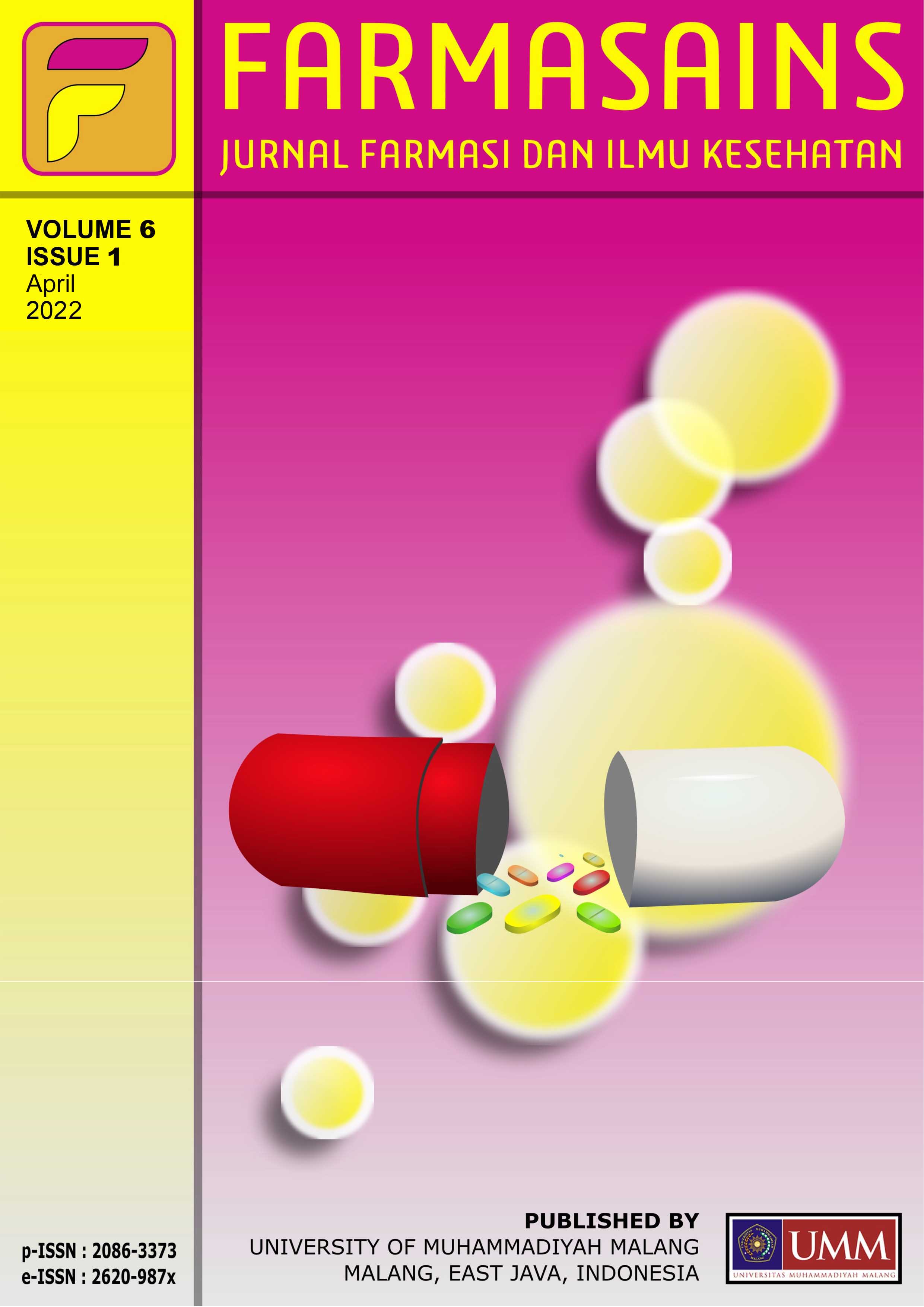Behavioral factor analysis of the accuracy in using gastritis drugs at the Puskesmas Arjuno in Malang City with the Health Belief Model (HBM) approach
DOI:
https://doi.org/10.22219/farmasains.v6i1.14173Keywords:
Accuracy, Gastritis medicine, Health Belief ModelAbstract
This study aims to analyze the behavioral factors according to the Health Belief Model (HBM) theory, which affects the accuracy in using gastritis drugs at Arjuno Health Center, Malang City. This research is a non-experimental study with an analytical observational research design. The instrument used a valid and reliable questionnaire. There were two variables used, the independent variables, namely the factors of the theory of the HBM (Perceived susceptibility, Perceived severity, Perceived Benefits, Perceived barriers, and Self Efficacy), and the dependent variable is the proper usage of gastric drugs. The number of samples used int this study was 80 respondents. The regression test results on each factor of HBM theory on the accuracy of using gastritis drugs (p < 0.05) means significantly affected the accuracy of using gastritis drugs except for perceived barriers, which is a significant value of 0.301 > 0.05. This result is relevant to the theory which states that the higher perceived barriers, the correct use of drug will be lower. Then for the Anova test, all independent variables were tested with the dependent variable and the results means that there is an influence between the HBM theory and the accuracy of using gastritis drugs. If measured simultaneously, factors from the HBM affect the accuracy in using gastritis drugs with a significant effect of 64.9%.
Downloads
References
Arlini, L. (2015). Hubungan Antara Health Belief Dengan Perilaku Compliance Pada Remaja Penderita Gastritis Kronis di RS Hasan Sadikin Bandung. (Undergraduate Thesis). Universitas Islam Bandung, Bandung, Indonesia.
Attamimy, H. B., & Qomaruddin, M. B. (2017). Aplikasi health belief model pada perilaku pencegahan demam berdarah dengue. Jurnal Promkes: The Indonesian Journal of Health Promotion and Health Education, 5(2), 245-255. doi: 10.20473/jpk.v5.i2.2017.245-255
Fitriani, Y., Pristianty, L., & Hermansyah, A. (2019). Pendekatan Health Belief Model (HBM) untuk Menganalisis Kepatuhan Pasien Diabetes Melitus Tipe 2 dalam Menggunakan Insulin. PHARMACY: Jurnal Farmasi Indonesia, 16(2), 167-177. doi: 10.30595/pharmacy.v16i2.5427
Hermawati., Suhadi., & Saktiansyah, L. O. A. (2018). Hubungan faktor lingkungan dengan kejadian penyakit infeksi saluran pernapasan akut (ISPA) di wilayah kerja Puskesmas Abeli Kecamatan Abeli tahun 2018. JIMKEMNAS: Jurnal Ilmiah Mahasiswa Kesehatan Masyarakat, 3(3), 1-8.
Hidayati, I. R., Damayanti, D. A., & Pristianty, L. (2020). Analysis of Behavioral Factors on Medications in Gout Patients with Health belief Model Theory. Journal of Global Pharma Technology , 12(8), 79–84.
Hungan, W., Supit, D., & Kabo, D. R. G. (2016). Hubungan Pola Makan dan Stres Dengan Kejadian Gastritis Pada Pasien Yang Berobat di Puskesmas Remboken. Buletin Sariputra, 6(2), 92-99.
Khusna, L. U. (2016). Hubungan Tingkat Pengetahuan dengan Upaya Pencegahan Kekambuhan Gastritis di Wilayah Kerja Puskemas Gatak Sukoharjo (Undergraduate’s Thesis). Universitas Muhammadiyah Surakarta, Solo, Indonesia.
Sani, W., Tina, L., & Jufri, N. N. (2016). Analisis faktor kejadian penyakit gastritis pada petani nilam di wilayah kerja Puskesmas Tiworo Selatan Kab. Muna Barat Desa Kasimpa Jaya tahun 2016. JIMKEMSNAS: Jurnal Ilmiah Mahasiswa Kesehatan Masyarakat, 1(4), 1-12.
Selviana, B. Y. (2015). Effect of Coffee and Stress with the Incidence of Gastritis. Majority, 4(2), 1-5.
Sunarmi. (2018). Faktor-Faktor Yang Berisiko Dengan Kejadian Penyakit Gastritis. Babul Ilmi: Jurnal Ilmiah Multi Science Kesehatan, 8, 61-78. doi: 10.36729/bi.v8i0.97
Tussakinah, W., Masrul., & Burhan, I. R. (2018). Hubungan pola makan dan tingkat stres terhadap kekambuhan gastritis di wilayah kerja Puskesmas Tarok Kecamatan Payakumbuh tahun 2017. Jurnal Kesehatan Andalas, 7(2), 217-225.
Wells, B. G., DiPiro, J. T., Schwinghammer, T. L., & DiPiro, C. V. (2015). Pharmacoterapy Handbook, 9th ed. New
York, NY: McGraw-Hill Education.
World Health Organization [WHO]. (2016). Global Report on Diabetes. Geneva, Swiss: Authors.
Downloads
Published
How to Cite
Issue
Section
License
Copyright (c) 2021 Firdha Julianty Sukma, Ika Ratna Hidayati, Liza Pristianty

This work is licensed under a Creative Commons Attribution 4.0 International License.
Authors who publish with this journal agree to the following terms:
a. Authors retain copyright and grant the journal right of first publication with the work simultaneously licensed under a Creative Commons Attribution License that allows others to share the work with an acknowledgement of the work's authorship and initial publication in this journal.
b. Authors are able to enter into separate, additional contractual arrangements for the non-exclusive distribution of the journal's published version of the work (e.g., post it to an institutional repository or publish it in a book), with an acknowledgement of its initial publication in this journal.
c. Authors are permitted and encouraged to post their work online (e.g., in institutional repositories or on their website) prior to and during the submission process, as it can lead to productive exchanges, as well as earlier and greater citation of published work (See The Effect of Open Access).













